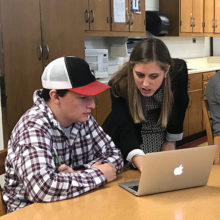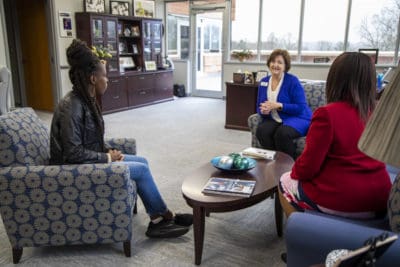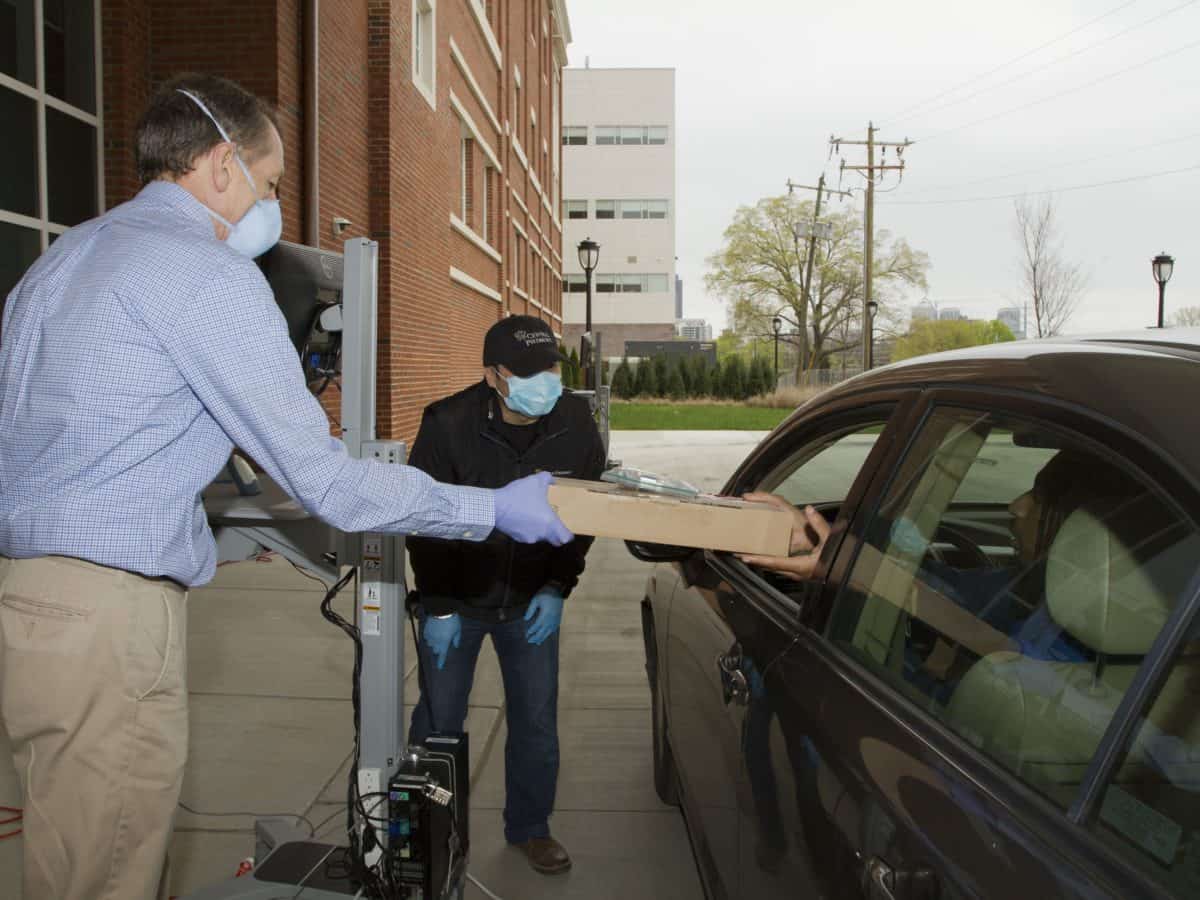
On March 17, Peter Hans, president of the North Carolina Community College System, advised North Carolina’s 58 community colleges to pause face-to-face instruction and move courses online. Since that announcement, community college leaders, instructors, and staff have worked tirelessly to do just that.
Focused on their students’ needs, each college is taking a different approach. Some extended their spring break while faculty and staff worked out how to move courses online. Many have paused laboratory-based and workforce classes that are difficult, if not impossible, to move online.
A common challenge faced by all colleges is ensuring students and faculty have both the technology and the Wi-Fi necessary to participate in online courses. This challenge looks different from college to college, and each is taking its own approach.
Expanding internet access on and off campus
“If you live in Snake Bite, in the woods of Bertie County, where the sun doesn’t seem to come out until 12 o’clock, you probably don’t have reliable internet,” said Ken Boham, interim president at Martin Community College. “Look, our students are resourceful. During the hurricane, they went to Bojangles or Burger King for Wi-Fi, but where do they go when those places are closed?”
As colleges have shifted online over the past two weeks, community college leaders and staff voiced concerns about the very real challenges facing faculty and students without internet access at home. While rural areas of the state, like Bertie County, may have more residents without internet access, every college is facing this issue.
“I would like to believe that Wake County was covered and everybody had access to broadband,” said Ryan Schwiebert, chief information officer at Wake Technical Community College. “I can say that they don’t. We still have rural areas. We still have people who can’t afford broadband.”
Colleges have moved quickly to meet the demands of the moment, starting by assessing faculty and student needs.
“For students, our primary concerns were for those who may not have internet access or a computer/device or both,” said Caldwell Community College & Technical Institute President Mark Poarch. “We are capturing information from a survey and other methods to determine the number of students with technology challenges.”
Some colleges have extended Wi-Fi access throughout their campus to support students, creating drive-in hotspot access points in their parking lots.
John Gossett, president of McDowell Technical Community College, and his team moved access points to the outer reaches of numerous buildings and quickly pushed out communications to their student body and faculty to let them know where they could park to access the college’s Wi-Fi network.
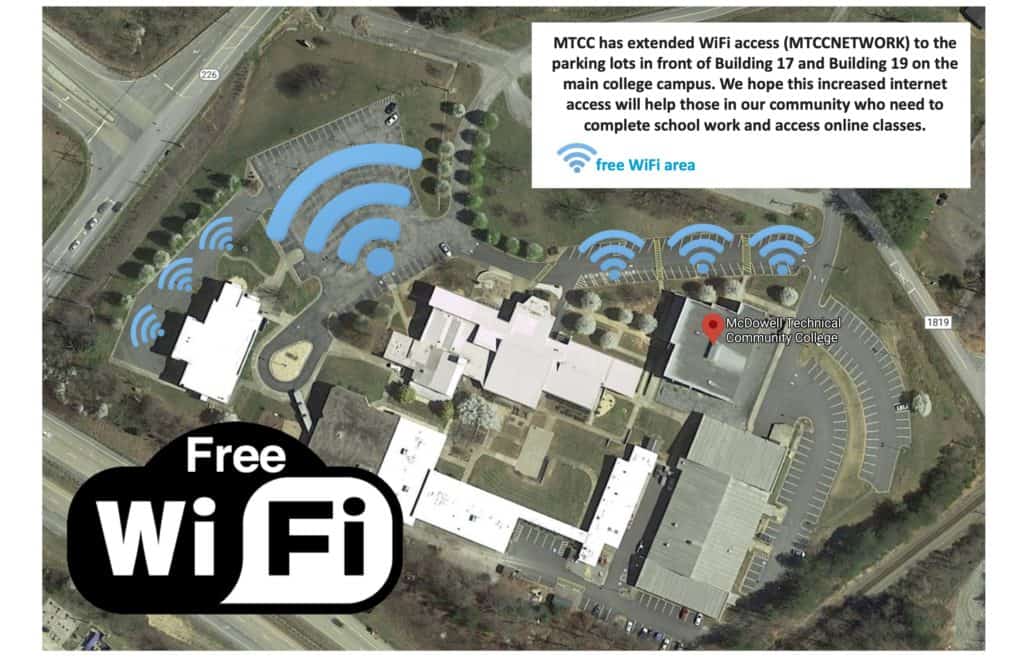
Gossett said the college estimates that only 30% of McDowell County residents have access to reliable high-speed internet.
Central Carolina Community College did the same.
“Our college IT staff relocated internal access points to the windows nearest accessible parking lots,” said Lisa Chapman, president of Central Carolina. “They had to ensure network drops were near the windows that were being used for this purpose, and they were careful to select parking lots within surveillance views of cameras and those located on the front side of each campus location.”
The Central Carolina Wi-Fi network is also set to a timer to ensure both access and security for their students.
Forsyth Technical Community College has followed a similar strategy. It is following social distancing requirements while also moving Wi-Fi access points outside during the day while staff are present to expand what they are calling “drive-in hotspots.”
With the announcement last week of a statewide stay-at-home order, some were worried they would have to abandon the drive-in hotspot access points. However, the order lists educational institutions as essential services, so colleges are able to move forward with their plans.
Colleges are also working with local internet service providers to ensure broadening the availability and access of internet hotspots across their counties. In addition, a number of providers across the state, including Spectrum, have announced programs to provide free internet access for a period of time.
Caldwell Community College partnered with Google to provide Chromebooks to students and is looking to expand on a 2016 Google pilot that provided Wi-Fi access across the county on school buses.
Other colleges remain focused on providing access to libraries and student resource centers while maintaining social distancing.
Dale McInnis, president of Richmond Community College, said Richmond plans to keep its library open for now with an emphasis on safety. The school is measuring temperatures at the library entrance, setting up computers and seating with a six-foot distance between each station, and barring children.
Vance-Granville Community College is also maintaining access to four resource centers, but they are open by appointment only due to a new sanitation process the college has put in place.
Beaufort County Community College is keeping their libraries and tutoring centers open and exploring how to provide transportation vouchers for the local bus system for students who need to access them.
“I think it’s absolutely essential for the community of all four of our counties to know that the college is still operating,” said Dave Loope, president of BCCC. “That we’re there for them to the greatest extent possible during this whole event. That we’ll try to meet their educational needs however we can.”
Distributing devices to faculty and students
Access to Wi-Fi means nothing if students and faculty do not have a way to utilize it.
In a recent webinar hosted by American Council on Education, Kenya Ayers, president of the Northeast Campus of Tarrant County College in Texas, shared that their first step to moving online was understanding whether faculty had the technology and internet access necessary.
“Part of our conversation had to be, and this was an eye opener for me,” Ayers said, “we had to really understand what our faculty had at home as far as technology.”
Ayers and her team redeployed laptops they already had to make sure faculty had the equipment necessary to teach online. Community colleges in North Carolina are similarly finding it necessary to equip faculty to teach remotely.
Through its partnerships with technology companies, Wake Technical Community College passed out Lenovo and Dell laptops to faculty. They then set up a laptop servicing station outside to get faculty prepared to begin online courses on Monday, March 30.
“It has been an opportunity for IT departments to show what they’re capable of in education,” said Schwiebert. “A lot of times we get relegated to utilitarian service, and we’ve shown how innovative and creative we can be.”
Colleges are also loaning out devices to students, either ones they already own or new devices they are purchasing with help from their foundations to offset the cost.
Central Piedmont Community College (CPCC) started passing out Chromebooks, hotspots, and other technology to students and staff on Thursday, March 26 via a drive-thru.
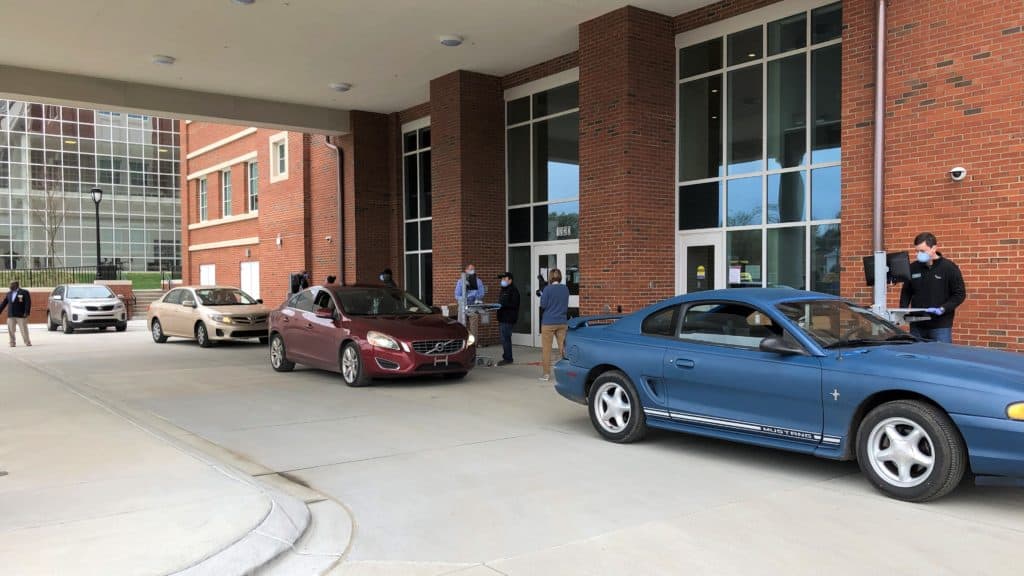
Kandi Deitemeyer, president of CPCC, said the college was able to purchase multiple devices with the help of their bookstore and foundation. Once they were available, they let students know when and where to come pick them up from staff wearing protective equipment. On the first day, staff handed out around 80 to 90 Chromebooks, Deitemeyer said, and they repeated the process over the weekend for students who were unable to come on Thursday.
“I stood there today with my gloves and my mask on next to faculty and staff and other leaders of the college, and it lifted my heart,” Deitemeyer said. “You know 80 doesn’t sound like a lot when you are talking about CPCC, but it’s 80 today. And there will be 80 more tomorrow.”
As colleges adjust to this new normal, there are still many challenges that lie ahead. However, leaders and faculty are committed to helping their students. Deitemeyer summed up the attitude of many educators in this situation:
“You know when you get up every day that your heart is aligned to the mission, [and] it doesn’t really matter what’s going on in the world. You just keep at it,” she said.

